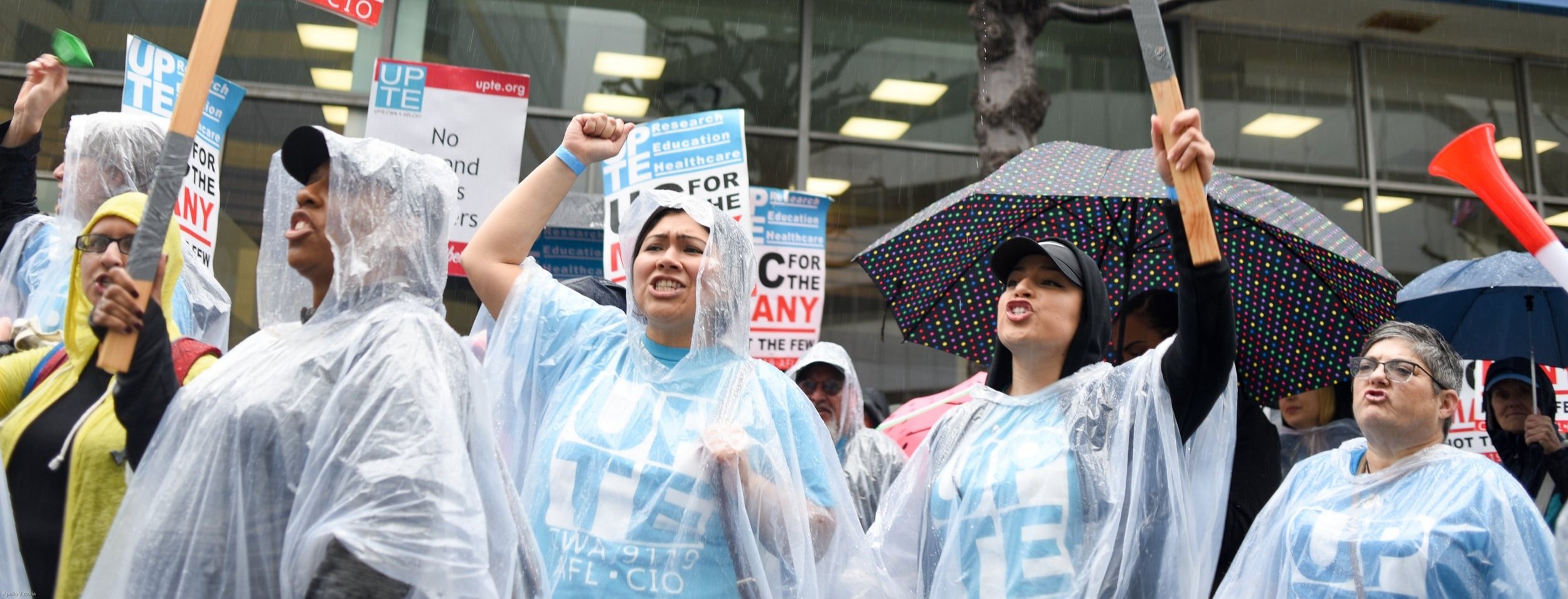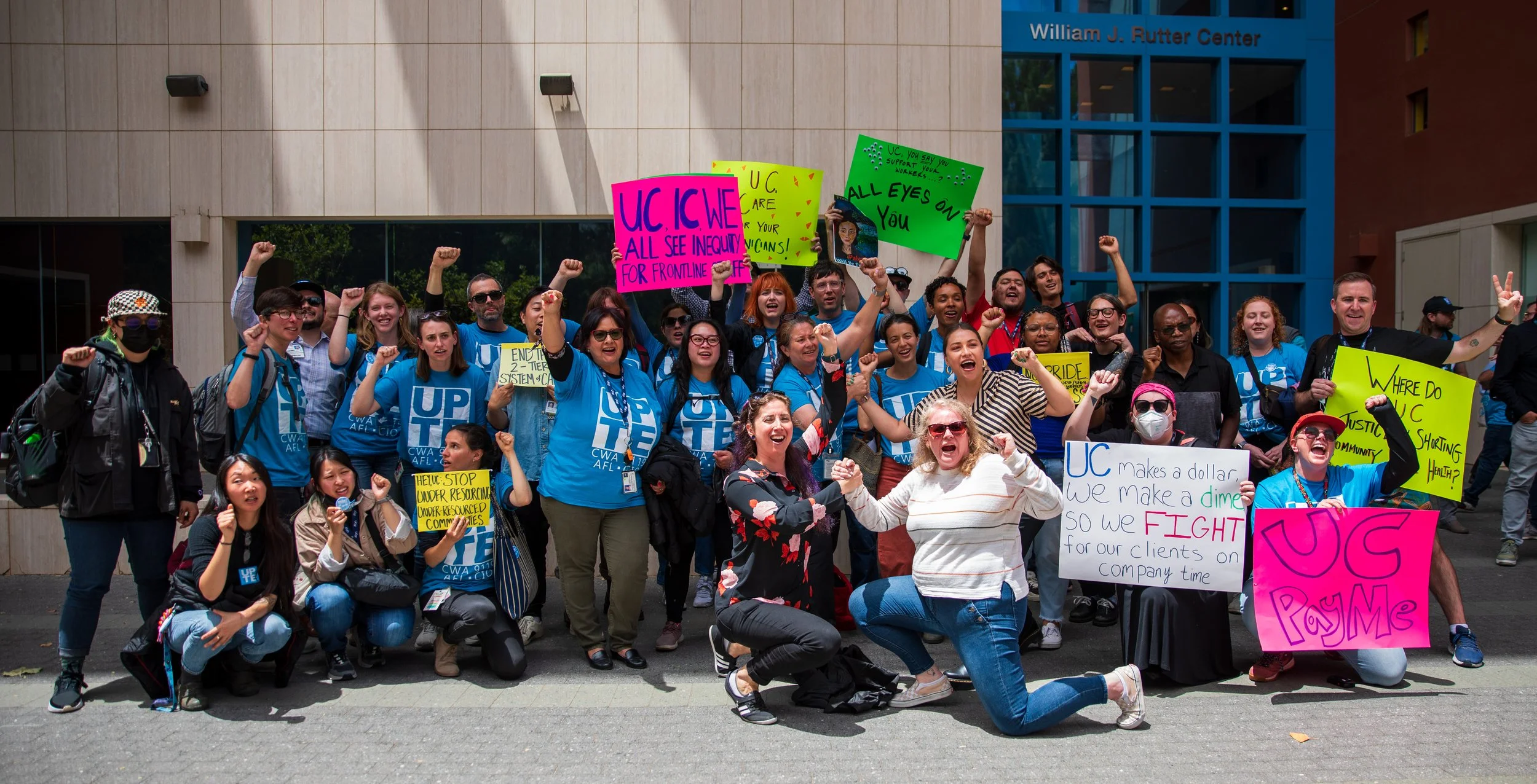

Invest in UCSF Campus Social Workers: A Win for All San Franciscans
Stronger social safety nets save lives and tax dollars! San Francisco now sees more hospital stays for depression than for asthma, suicide claims twice as many residents as homicide, and fentanyl kills two San Franciscans every single day. Clinical social workers (CSWs) lead harm‑reduction and diversion efforts that keep people alive and out of crisis—yet UCSF still funds them through short‑term grants, leaving critical care underpaid and unstable.
Sign our petition!
-
“Campus” social workers are employed at UCSF’s Campus clinics, San Francisco General Hospital and Trauma Center, Hospital and Trauma Center, the Division of Citywide Case Management Programs, the UCSF Trauma Recovery Center, the Division of Substance Abuse and Addiction Medicine, the UCSF Alliance Health Project, among many others. Their patients have serious mental illness, substance use disorders, and various forms of severe trauma. Many of them are underinsured and may be unhoused.
Citywide Case Management, one of the many programs staffed by Campus CSWs, serves over 1,500 clients annually. Patients are 40% Black & Latinx, 70% actively using substances, and 100% experiencing serious mental illness.
More than 52% of Campus CSWs are in the lowest Master’s level title.
Work in settings like SFGH, which derives a majority of its funding from Medi-Cal.
“Medical Center” social workers are employed primarily at the UCSF Helen Diller Medical Center at Parnassus Heights, the UCSF Medical Center at Mission Bay, the UCSF Medical Center at Mount Zion, the UCSF Langley Porter Psychiatric Hospital, and the UCSF Nancy Friend Pritzker Psychiatry Building. They are funded through UCSF Health and have patient populations that are almost fifty percent white, with large percentages (38-68%) of patients insured through private third-party insurers.
Primarily at UCSF Parnassus, Mission Bay, Mt. Zion, and the Langley Porter Psychiatric Hospital. Almost 50% of patients are white, with large percentages of patients insured through third-party insurers.
There are zero Medical Center CSWs in the lowest Master’s level title.
Work in settings where no more than 25%, and as little as 0%, of revenue is from Medi-Cal.
-
Stabilize streets & transit by guiding 1,500+ unhoused or high‑risk clients away from EDs and jails.
Reduce public‑health costs through early intervention that prevents costly hospital readmissions.
Strengthen hospital flow—fewer psychiatric bottlenecks mean shorter wait times for every patient.
Deliver specialty outpatient care—Trauma Recovery Center (TRC), AIDS Health Project (AHP), Intensive Pain Program (IPP), and Child & Adolescent Services (CAS)—so patients stay healthy and out of crisis without returning to the ED.
-
City leaders and UCSF can secure healthier, safer neighborhoods by:
Close the 29 % pay gap so experienced CSWs stay on the job.
Add Campus CSWs to UCSF’s operating budget for stable, long‑term care.
Ensure safe staffing & worksites so CSWs can focus on serving the public.
Unequal pay hurts public health
| Campus Clinical Social Workers | Medical Center CSWs | |
|---|---|---|
| Core mission | Community‑based, inpatient & outpatient UCSF mental‑health programs affiliated with SFGH (Citywide, TRC, AHP, Ward 86, Methadone Clinic, CAS, PES, EDCM) | Inpatient & ambulatory healthcare coordination, therapeutic engagement, and discharge planning at UCSF hospitals & mental‑health treatment centers (e.g., Langley Porter Psychiatric Hospital, Pritzker Psychiatry Building) |
| Average pay | 29% lower—drives turnover | Competitive |
| Position stability | Grant‑funded, at risk | UCSF‑budgeted, permanent |
| Community impact | Rising behavioral & mental‑health crises, Continuous UCSF Health bottlenecks from preventable hospitalizations, all San Franciscans feel the effects of rising crises and service gaps | |
Clinical social workers (CSWs) are indispensable guardians of community well-being. After years of graduate study and supervised practice, they provide frontline mental health care that has a ripple effect across families and neighborhoods. Yet, UCSF’s much-touted single pay scale masks a two-tier reality—campus and community clinicians are routinely hired onto lower steps than their hospital-based peers, even though the formal salary ranges are identical.
See the difference in UC’s two-tier care system
Note: Campus and medical center pay scales are identical, but placement by HR/dept varies greatly.
| Credentials | Campus Clinical Social Worker | Medical Center CSWs | Difference | ||
|---|---|---|---|---|---|
| Title & Steps | Wage | Title & Steps | Wage | ||
| Bachelor’s degree | Social worker associate, Step 1 | $30.68 | |||
| Master’s degree; Provisional License (ASW, AMFT, APCC) | CSW1, Step 8* | $44.94/hr | CSW2, Step 19 | $57.79 | $12.85/hr or 25.02% |
| Fully licensed (LCSW, LMFT, LPCC) | CSW2, Step 11 | $49.33/hr | CSW3, Step 22 | $65.98 | $16.65/hr or 28.89% |
*As of September 2023, the campus entry level was raised to CSW1, Step 8. The prior entry-level placement was CSW 1, Step 1 ($38.69/hr), making a $19.10/hr or 37.18% difference.
The result is stark salary gaps of roughly 25–29 percent for provisionally or fully licensed staff, and in some cases, more than 60 percent at the time of hire. This shortfall does more than undermine professional sustainability—it drives experienced clinicians away from the very low‑income and minority communities that already face the greatest barriers to care. Closing these disparities is therefore a matter of the common good: fair, equitable compensation strengthens the behavioral‑health workforce, safeguards continuity of care, and aligns UCSF’s practices with its public mission to advance health equity for all.

